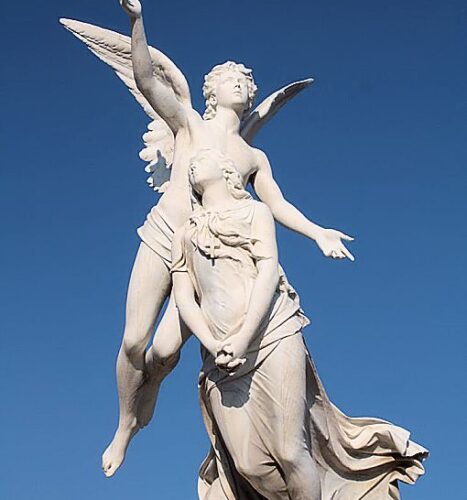
Daimon origin and meanings, character and destiny, the history of etymology and evolution of the concept, from the ancient Greece of Socrates and Plato to Hillman’s psychology and Brown’s methodology.
“… We refuse to establish a principled opposition between the two sets of etiological factors (constitutional and accidental), but admit that they always act together in the production of the observed effect. Daimon kai tuke (natural heritage and fate) decide the fate of a man; rarely, if ever, a single one of these forces.”
Sigmund Freud (1912): Dynamics of translation.
Perhaps he could have chosen in the best way, but his Daimon was not so reliable, moreover Dada doubted everything, and for this reason he almost never knew how to make the most appropriate choice, however he enjoyed trying, not without a certain nostalgic and melancholic suffering.
Carl William Brown
Of the celestial stars I will invoke the sacred splendor with voices conforming to the rite, calling the demons holy.
Orphic hymns, Scent of the stars-aromas
Ethos anthropoi daimon. (Character is destiny.)
Heraclitus
Character is destiny, that is, our life is closely linked to our behavior and vice versa.
Carl William Brown
The daimon that forces us, with need, to take the way: the little individual god, the Shiva within.
Carl Gustave Jung
The soul always metaphorizes.
Plotinus
A demon from ancient Greek δαίμων, trasl. dáimōn, “divine being” is a being who stands halfway between what is divine and what is human. In religious culture it acts as an obstacle between these two dimensions, in Greek philosophy, it acts as an intermediary between man and the divine.
According to Welcker, the term daimon is one of the oldest principles of Greek philosophy.
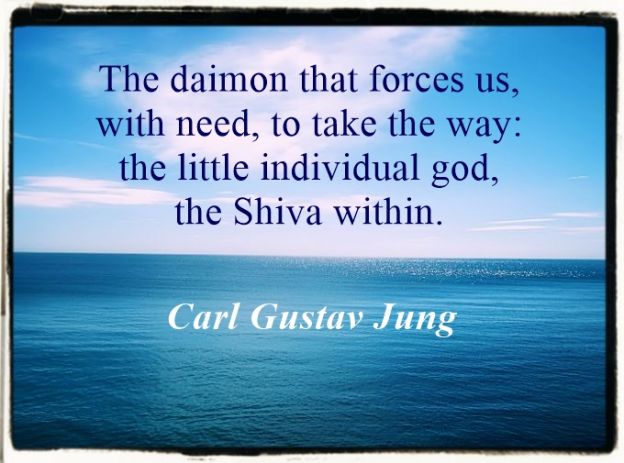
In Hesiod, who lived between the eighth and seventh centuries BC, the demon is the post-mortem state assumed by the beings of the first golden generation:
“Then, after the earth this race had covered, they are, by the will of the great Zeus, propitious demons, who are on earth, guardians of mortals, and observing the judgments of justice and wicked deeds, clothed in foggy air, everywhere prowling the earth, dispensers of riches: this royal privilege they possess.”
Hesiod
Then the first generation, the aura living at the time of Cronus, disappeared overwhelmed by sleep, Zeus then transformed them into demons, “guardians of mortals”, protectors of mankind.
In the Orphic religion the demon is the very essence of the soul, imprisoned in the body for a guilt committed and from which it tries to free itself.
Heraclitus (fifth century BC) speaks of it as a destiny linked to nature: “The character of a man is his daimon”.
Socrates
Socrates refers to a dàimon or “divine guide” who often assists him in his every decision. It would be a sort of “moral conscience” that is progressively revealed as a form of divine delirium and inspiration, a voice identifiable as the authentic nature of the human soul, its rediscovered self-awareness. According to Plato’s testimony, the daimon of which Socrates speaks consists in fact of a divine presence, similar to a tutelary genius, which is felt in him through signs to stimulate his reason to execute the most suitable choice, but not so much to induce him to perform certain actions, but rather to divert him:
“There is within me I know nothing but divine and demonic spirit; the one of which even Meleto, joking about it, wrote in the indictment. And it is like a voice that I have had inside since I was a child; which, whenever it makes me heard, always dissuades me from something I am about to do, and never makes me proposals.”
Apology of Socrates, 31 d
Through the daimon Socrates thus manages to express the highest degree of his typical irony even in the religious dimension.
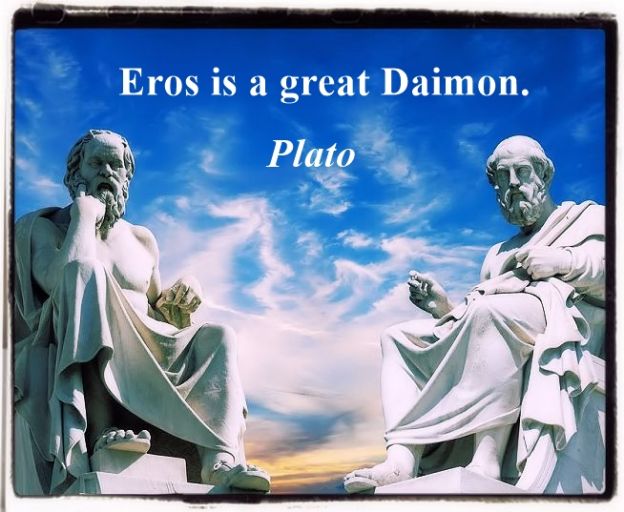
The interpreters were for the most part very disconcerted and gave the Socratic daimonion very disparate exegesis. Someone believed they could cut the question in the trunk, putting entirely into account the Socratic irony and its inventiveness the whole thing of the daimonion; others have understood this very peculiar Socratic experience in a psychiatric key, so to speak, that is, as a fact of a psychopathic nature; others, more moderately, have reduced it to the voice of conscience, or to the feeling of the convenient, or to the feeling that pervades genius; And the examples could be multiplied, up to modern interpretations in a psychoanalytic key or inspired by psychoanalysis. In truth, these are scholars who do not believe in the religious fact and resolve and dissolve it in a positivistic or rationalistic or psychological or psychoanalytic way and who, consequently, irreparably misrepresent what is peculiar in the experience of the Socratic daimonion.
First of all, it should be noted that daimonion is a neutral, and that therefore (and on this the interpreters of positivistic or rationalistic extraction have reason to insist) does not indicate a demon-person, that is, a personal being (a kind of angel or genius), but a fact or event or divine phenomenon: in fact never, neither in Plato nor in Xenophon, The daimonion is called “Demon”, but it is called “sign” and “divine voice”.
Having clarified this, however, it is immediately to be noted the following: a) expressly Socrates, in Plato’s Apology, connects the “divine sign” with the demons, explaining that, to the extent that he believes in “demonic things”, he believes in the demons and therefore in the Gods, from which the demons derive b) moreover, just as expressly, he connects him with God himself, saying without the possibility of equivocation that the sign and the voice he heard within himself were a sign of God and the voice of God.
Now, all Greekness has considered demons intermediaries between gods and men and it is highly probable, not to say certain, that this was also the belief of Socrates. For the Greek, it was not easy to think of an immediate contact or relationship of God with man, and the pluralistic conception of the divine, which, as we have seen, even shared Socrates, led in itself to think about the relationship between God and man through the intermediary of demons.
The “divine sign” therefore had to come to Socrates through a demon, however he avoided this word and it is not correct (as many do) to translate certainly daimonion with demon, because, in doing so, it makes explicit what Socrates deliberately left in the indeterminate: he, in fact, preferred to stick to what he felt in himself and to qualify this phenomenon as divine, without deepening the way in which it took place and for what mediation.
Continuing our analysis we must conclude that the real meaning of the “daimon” for Socrates has been variously interpreted: with this term, according to Paolo De Bernardi, he seemed to indicate the authentic nature of the human soul, its newfound self-awareness. While for Gregory Vlastos the dáimon sent its signs in order to stimulate the reason of Socrates to make the most suitable choice. Giovanni Reale following Vlastos believes that the dáimon in Socrates expressed the highest degree of Socratic irony also in the religious dimension.
However, the authors agree that in the Socratic conception the element of interiority referred to eudemonia was prevalent, that is, happiness, inner serenity was the effect of a rational behavior directed to virtue.
This is the so-called ethical intellectualism of Socrates who maintained that the only possible cause of evil was ignorance of the good “I know instead that committing injustice and disobeying those who are better than us, god or man, is ugly and bad. Therefore, in the face of evils that I know to be evil, I will not fear and I will never flee those that I do not know if they are also goods.” but once the good was known, it was not possible to refrain from acting morally by realizing the good that was in itself “pleasant” as it generated eudemonia, the serenity of the soul.
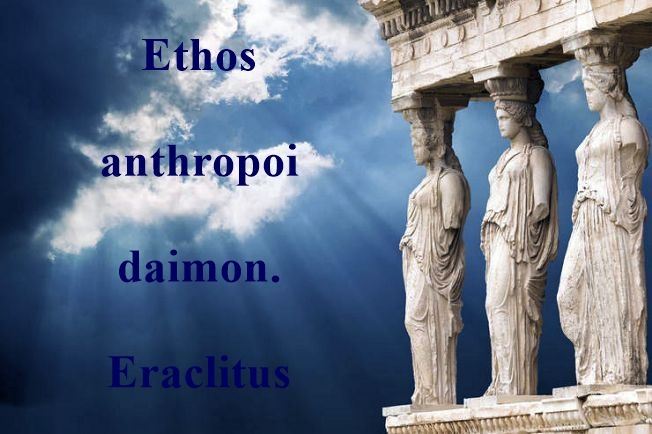
Eudaimonism
“Eudemonism. Every doctrine that assumes happiness as the principle and foundation of the moral life.”
Nicola Abbagnano placeholder image
The term Daimon also appears central to eudemonism, that is, the moral doctrine that placing the good in happiness (eudaimonia) pursues it as a natural end of human life.
From eudemonism must be distinguished hedonism which proposes as the end of human action the “attainment of immediate pleasure” understood as enjoyment (as the Cyrenaic school of Aristippus thought) or as the absence of pain (according to the Epicurean conception).
The term derives from the Greek – εὐδαιμονισμός – (eudaimonismòs), from – εὐδαιμονία – (eudaimonìa), composed of good (εὖ èu) and spirit guide-fate (δαίμων dàimōn), a term also associated with “divine being”, “genius”, “spirit guide”‘ or “conscience”. In a broad sense, “eudemonia” means “to be in the company of a good spirit”.
Emilio Lledò, professor of History of Philosophy at the Universidad Central of Barcelona, responds on the research around the good, the good existence, in Greek philosophy and explains the concept of eudaimonia, whose semantic field in Greek is wider than that of “happiness” in Italian. According to his etymology, this word refers to a conception according to which happiness depends rather on the benevolence (eu) of the daimon than on the autonomous action of man. Lledò refers here in particular to Aristotle, who after having, in Book I of the Nicomachean Ethics, put in close relationship the pursuit of good with the search for happiness and virtue, returns to another place of the same treatise (L. IX, 9, 1169 b) to refute the adage that “he who has a good daimon does not need friends”.
Returning to the deep meaning of the term in question and to the character related to the personal Daimon by Heraclitus and then also by Freud, I feel I am very close to Aristotle who believed that each individual was endowed with a particular vocation, a special inclination, I could add a more or less creative genius, that he called “daimon”. For the undersigned, therefore, everyone has his own Daimon that must be protected, studied, deepened, researched, perfected, cultivated, and put in close relationship and communication with the most intimate, intellectual and spiritual part of our person. Let’s also say that it is a symbolic and metaphorical element that characterizes us and that should push us towards good and therefore a constant improvement, or towards more problematic experiences and perhaps harmful to ourselves, which is why in this case it would be a negative Daimon, which instead of helping us to feel better, would do its best to make us feel worse. In any case, the Daimon always identifies with ourselves and is obviously not an element external to our individuality.
Plato and Xenocrates
In Plato the demon Eros, son of Penia and Porus, is that demonic force that allows man to rise towards the supersensible.
Thus in Plato’s Symposium the teaching on Eros imparted by Diotima to Socrates is narrated:
“Eros is a great demon, O Socrates: for all that is demonic is intermediate between God and mortal. It has the power to interpret and bring to the gods the things that come from men and to men the things that come from the gods: of men the prayers and sacrifices, of the gods, instead, the commands and rewards of sacrifices. And standing between them, it works a completion, so that the whole is well connected with itself.”
Plato, Symposium 202, G-D
A fundamental idea, inherent in the name itself, that Plato helped to spread is precisely that of the Daimon. “Daimonia kaina” literally means “new divine (creatures)”. The daimonion spoken of in the Apology is the neutral adjective that comes from daimon (from daiomai: pantry, do in lote), a divine creature not necessarily malevolent, who presides over the fate of men, a kind of tutelary genius, a spirit that advises and directs us, and that stimulates us to reflect, without imposing its decisions on us.
A daimon is contained in the word eudaimonia (happiness), which means, etymologically, something like: “a good daimon rules my destiny”. The daimon is the divine creature who presides over the destiny of each one. In Er’s story, the daimon does not happen to be a lot, but is the object of a choice. Freedom of choice makes virtue “without a master”, unlike what happened in traditional morality, where this was the prerogative of a well-determined social figure, the aristos, or in any case of an extremely small group.
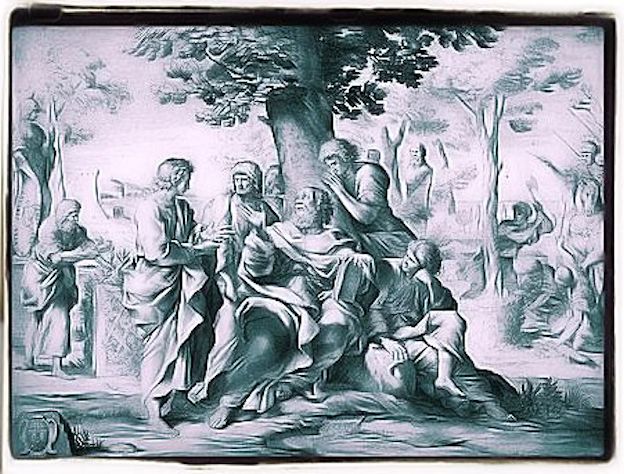
In another dialogue, The Symposium, Plato describes demons as messengers of the divine will and beings of contact between mortals and gods: It is thanks to the demonic element that divination and the practices of priests could have taken place, in relation to things that have to do with sacrifices, initiation rites, spells, different prophecies and magic. (202E-203A)
With Xenocrates the figure of the demon taken from Plato’s work is analyzed. The demons for Xenocrates are always intermediary beings between men and gods, they are more powerful than men but less than gods. Unlike the latter who are always good, among the demons there are also bad ones. When the ancient myths tell of divinities fighting each other involved in human passions they, for Xenocrates, speak of demons not gods. Demons have a prominent place both in acts of worship and in oracles. The demons finally correspond to human souls freed from bodies after death, remaining in them the conflict between good and evil, they transfer it from the Earth to the celestial world.
The same theses of Xenocrates can be found in the text De deo Socratis by Apuleius.
Stoicism
Even the Stoics maintain the existence of demons as beings who watch over men by sharing their feelings. Thus Diogenes Laertius:
“The Stoics say, then, that there are also some demons who have sympathy for men, who watch over human affairs, and also that there are heroes, that is, the surviving souls of the virtuous.”
Diogenes Laërtius, Lives and Doctrines of the Illustrious Philosophers Book VII, 151
Marcus Aurelius indicates as a demon the intellectual soul that must be cared for and deprived of disturbances:
“Moreover, there remains the care not to sully the demon that has taken up residence in our breast, the care not to disturb it with confused and manifold impressions; to keep him serene and kind, giving him ritual and honor as to a God; and say nothing that is contrary to the truth; do nothing against justice.”
Marcus Aurelius, Conversations with Himself Book III, 16
Middle and Neo-Platonism
With medioplatonism the figure of the demon is characterized in an increasingly articulated way and is inserted as the third aspect of the hierarchy of the divine after the supreme god and the secondary gods.
Thus Plutarch:
“Plato, Pythagoras, Xenocrates, Chrysippus, followers of the primitive writers of sacred things, affirm that the Demons are endowed with superhuman strength, indeed they far surpass our nature by extension of power, but they do not possess, moreover, the pure and uncontaminated divine element, but participate, at the same time, in a double fate, as to a spiritual nature and bodily sensation, so it welcomes pleasure and labor; And this mixed element is precisely the source of the disturbance, greater in some, lesser in others. So it is that even among demons, no more and no less than among men, differences arise in the gradation of good and evil.”
Plutarch, Isis and Osiris, 25
Alexander of Aphrodisias argues that the daimon of every man consists in his own nature.
In Neoplatonism, Plotinus entrusts to the “daimon that has befallen us by lot” the task of guiding us in the ascent to the suprasensible, through the power of eros and beauty. Since conscious and purely logical thought is not enough, it is also a mystical inspiration, the spark of a divine spirit thanks to which it is possible to rise from the material to the intelligible dimension. According to Porphyry, Plotinus himself was assisted “by one of these demons who are close to the gods”.

Change of meaning
Subsequently, the negative use gave the Christian vocabulary the term to designate the evil spirit (devil), becoming from then on the object of study of demonology. In positive terms, however, the meaning of daimon can be compared in some ways to the guardian angel, or to the notion of tutelary guide or genius.
Renaissance philosophers loved to compare the texts of Plato and Aristotle with Arabic astrology with the precise purpose of investigating on themselves the spiritual meaning of the Daimon of birth, a mysterious force from which character, vocation and fortune originate. Interpreting Mercury, the Sun or Mars on the ascendant of birth meant in fact being predisposed to exercise some bodily talents over others, or certain mental abilities over others. Those who had the female planets on the point of the zodiac where the sun rose could instead expand the qualities of the soul, namely perception, intuition and sensory awareness, essential qualities to become artists, poets and court jesters.
The Greek term Daimon means genius, spirit guide, divine power, and also, inferior deity or deified hero, but not only, in fact the verb expressed by this word also meant to divide, distribute, share, share and the suffix “from” was common to words such as democracy, demiurge and other terms that derived from the name “demos” ie people, And perhaps this is why he was never looked upon favorably by the official power, which did not want to share its privileges and saw in the genius of criticism the devil of evil. Thus Satan was born from genius, for Carducci “the vindex force of reason”, for Baudelaire “le plus savant et le plus beau des anges”.
Carl William Brown
“Before birth, the soul of each of us chooses an image or design that we will then live on earth, and receives a tutelary spirit to guide us, a daimon, which is unique and typical of us. However, in coming into the world, we forget all this and believe that we have come empty. It is the daimon that recalls the content of our image, the elements of the chosen design, it is therefore the bearer of our destiny”.
J. Hillman, The Code of the Soul
The philosopher, as well as the scientific researcher, the artist or the poet, implements his conception in the absence, and the absence of the object constitutes precisely “the peculiar trait of the image”. Who is animated by genius or daimon creates, in a broad sense, images, thoughts and ideas of extraordinary effectiveness with which to draw reality, especially where reason runs aground and urgently requires, for example, the help of imagination, storytelling and myth. Obviously in all these reflections the influence of Platonic philosophy and all its creations is evident, starting from ideas, to reach the ideal state, through study, wisdom, and the pursuit of good.
Obviously the term Daimon is consecrated by Plato in his famous myth, the story of Er, described in the tenth book of the Republic. Er, dead in battle and resurrected after twelve days, wakes up shortly before being burned at the funeral stake and begins to narrate his experience “between lives”, tells men the fate that awaits them after death, emphasizing how it will not be the Daimon to choose souls, but souls to choose their own Daimon, So the ethical responsibility does not lie with the God, but with the same men who have freely chosen among the various paradigms or models of life proposed to them in the afterlife.
Plato writes: “It will not be the demon who chooses you, but you the demon (…). Virtue has no masters; the more each of you honors it, the more it will have; The less it honors it, the less it will have. The responsibility, therefore, lies with those who choose. The god is not to blame.” This daimon, which we can also call “genius”, an inescapable component of our ego, can sometimes be lost sight of, not cultivated, set aside, but sooner or later it will return to possess us totally, to define our image, our true personality. For Plato, therefore, we are what we have chosen to be.
In short, each of us has his own personality, his own vocation, his own image, his own character, his own distinctive traits, not only physical, but clearly also mental, and all these elements distinguish us in a radical way, but everything is still in transformation, things change, everything flows, and therefore it is up to our seriousness to look for the right motivation and then feed it with maximum commitment, trying to do in the best way what we are doing, taking care to improve our possibilities day by day, to make our existence truly authentic and useful, not only to ourselves, but also to others and to the society in which we live.
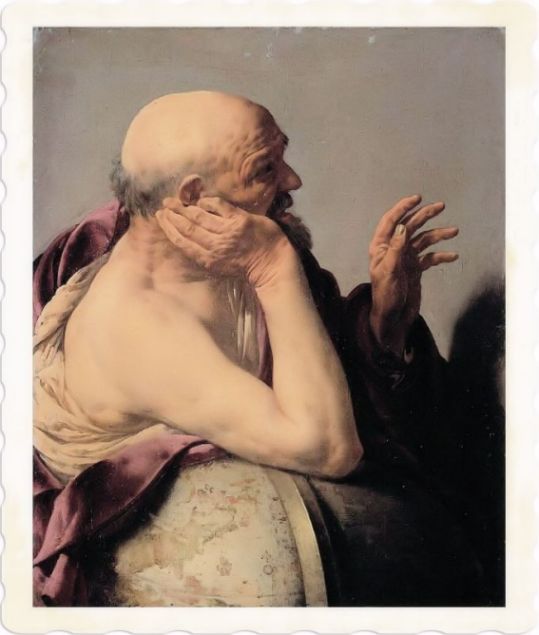
As we have seen, the daimon is an ancient image, present, with different names, in different cultures: in ours it could be, in some ways, assimilated to that of the guardian angel, in the cultures of Central America it is defined as a “nagual”, a sacred animal, a guiding spirit that can be perceived in the experiences of altered consciousness such as those that are reached with the intake of psychotropic drugs.
The Daimon is still an idea, an image, a mythological creation, a metaphor that must be deciphered, literalism makes it “solid” and concretizes its terms making them become real. Speaking of daimon I obviously do not describe an entity in flesh and blood or a “spiritual being” but, rather, a figure that helps us to understand something about our interiority.
For those wishing to learn more about the topic, I suggest the following articles, for the moment mostly in Italian, but soon they will be also translated into English.
Daimonology synthetic principles

